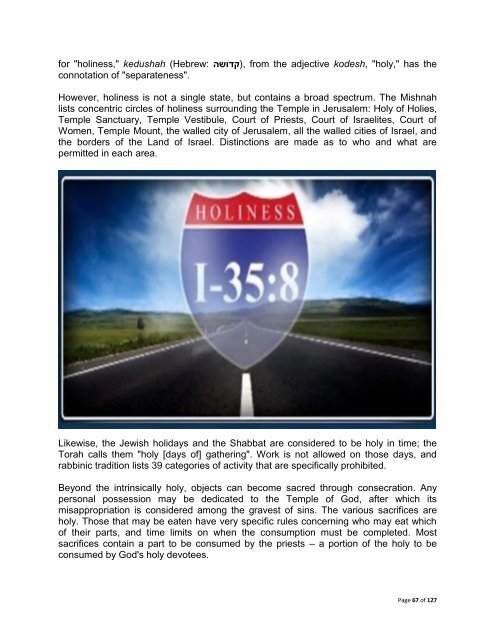Acquiesce to Righteousness
Acquiesce to Righteousness
Acquiesce to Righteousness
Create successful ePaper yourself
Turn your PDF publications into a flip-book with our unique Google optimized e-Paper software.
for "holiness," kedushah (Hebrew: ,(קדושה from the adjective kodesh, "holy," has the<br />
connotation of "separateness".<br />
However, holiness is not a single state, but contains a broad spectrum. The Mishnah<br />
lists concentric circles of holiness surrounding the Temple in Jerusalem: Holy of Holies,<br />
Temple Sanctuary, Temple Vestibule, Court of Priests, Court of Israelites, Court of<br />
Women, Temple Mount, the walled city of Jerusalem, all the walled cities of Israel, and<br />
the borders of the Land of Israel. Distinctions are made as <strong>to</strong> who and what are<br />
permitted in each area.<br />
Likewise, the Jewish holidays and the Shabbat are considered <strong>to</strong> be holy in time; the<br />
Torah calls them "holy [days of] gathering". Work is not allowed on those days, and<br />
rabbinic tradition lists 39 categories of activity that are specifically prohibited.<br />
Beyond the intrinsically holy, objects can become sacred through consecration. Any<br />
personal possession may be dedicated <strong>to</strong> the Temple of God, after which its<br />
misappropriation is considered among the gravest of sins. The various sacrifices are<br />
holy. Those that may be eaten have very specific rules concerning who may eat which<br />
of their parts, and time limits on when the consumption must be completed. Most<br />
sacrifices contain a part <strong>to</strong> be consumed by the priests – a portion of the holy <strong>to</strong> be<br />
consumed by God's holy devotees.<br />
Page 67 of 127

















